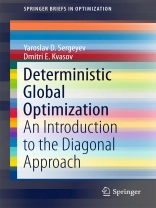This book begins with a concentrated introduction into deterministic global optimization and moves forward to present new original results from the authors who are well known experts in the field. Multiextremal continuous problems that have an unknown structure with Lipschitz objective functions and functions having the first Lipschitz derivatives defined over hyperintervals are examined. A class of algorithms using several Lipschitz constants is introduced which has its origins in the DIRECT (DIviding RECTangles) method. This new class is based on an efficient strategy that is applied for the search domain partitioning. In addition a survey on derivative free methods and methods using the first derivatives is given for both one-dimensional and multi-dimensional cases. Non-smooth and smooth minorants and acceleration techniques that can speed up several classes of global optimization methods with examples of applications and problems arising in numerical testing of global optimizationalgorithms are discussed. Theoretical considerations are illustrated through engineering applications. Extensive numerical testing of algorithms described in this book stretches the likelihood of establishing a link between mathematicians and practitioners. The authors conclude by describing applications and a generator of random classes of test functions with known local and global minima that is used in more than 40 countries of the world. This title serves as a starting point for students, researchers, engineers, and other professionals in operations research, management science, computer science, engineering, economics, environmental sciences, industrial and applied mathematics to obtain an overview of deterministic global optimization.
Table of Content
1. Lipschitz global optimization.- 2. One-dimensional algorithms and their accleration.- 3. Diagonal approach and efficient paritioning strategies.- 4. Global optimization algorithms based on the non-redundant partitions.- References.
About the author
Yaroslav
D. Sergeyev is the President of the International Society of Global Optimization and Distinguished Professor at the University of Calabria, Italy. He is also a Member of the University International Council and Professor at Lobachevsky Nizhniy Novgorod State University, Russia. His research interests include numerical analysis, global optimization, infinity computing and calculus, philosophy of computations, set theory, number theory, fractals, parallel computing, and interval analysis.
Dmitri Kvasov is an Assistant Professor at DIMES, University of Calabria, Rende, Italy and Senior Programmer at the Institute of Information Technology, Mathematics and Mechanics at Lobachevsky State University of Nizhny Novgorod, Russia. His research interest includes numerical analysis, continuous global optimization, and infinity computing.












